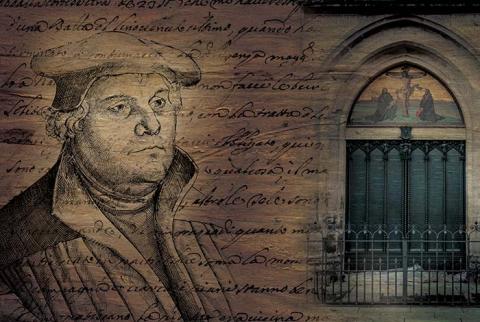Growing Up in Luther’s Shadow

The bestselling toy in the history of the German-based Playmobil toy company is Martin Luther. Putting Martin Luther on the market for the 500th anniversary of the Protestant Reformation was quite an ingenious strategy. A great deal of hype surrounds Martin Luther in Germany in 2017, including television specials, publications, and year-long events in various cities.
Why was Luther so important for the Reformation as well as for the history of Germany, Europe, and the world? Why did he cast such a long shadow? When Luther published his 95 theses on October 31, 1517, he could not have imagined what that would trigger—nothing less than the dawning of a new age not only for the church, but also for Europe and eventually the entire world.
Luther was not the first to criticize deficits in the teachings and practices of the Roman Catholic Church. There were others before him in different countries. But the combination of historical circumstances, scientific discoveries, political instability in the empire, and a new desire for individual freedom came together during the time of Luther. The spark started a wildfire. The invention of the printing press in the fifteenth century made possible the distribution of pamphlets. This helped the Reformation message spread quickly. Martin Luther was convinced that God Himself was at work to renew and reform.
The most important heritage of the life and work of Martin Luther and the entire Reformation was anchored in its principle teachings on the Christian faith. We can summarize the principle teachings into four: solus Christus (Christ alone), sola fide (faith alone), sola gratia (grace alone), and perhaps the best known principle, sola scriptura (Scripture alone), which identifies Scripture as the final arbiter of all matters of faith and practice.
Principle: Solus Christus (Christ Alone)
The principle of solus Christus emphasizes that we are saved only through Jesus Christ alone. This first Reformation principle expresses that the foundation for the Christian faith is a person: Jesus Christ. Jesus is the foundation of our faith. Humanity was created in the image of God (Genesis 1:27). However, we have sinned and turned away from God.
God did not give up on us, but provided a way to have fellowship with us again—through the person and work Jesus Christ His Son. Jesus Christ is also the content of our faith. We do not just believe truths about Jesus, we believe in Him. That means that our salvation is a personal relationship with God through Jesus Christ by which God Jesus Christ became a human being and died.
However, he did not remain in death, he was raised and lives and made possible eternal life.
Through faith in Jesus Christ, we can participate in what he has done: dying to our sin and being raised to new life. This is God’s gift to us (grace) which we can accept (faith). This grace is free to all. God loves everyone, and in grace reaches out to every human being.
Principle: Sola Fide (Faith Alone)
Sola fide (faith alone) might not seem special to us today, but for Luther it was the decisive discovery for his life and teaching. The question that troubled him all his life was how he could stand before a righteous God. He knew that he was a sinner and that God was holy. He also knew that Jesus Christ was the mediator of salvation.
But he understood Jesus Christ first of all as judge of the world whose grace and salvation must be earned. Luther was serious about his quest: he fasted, he confessed his sins as often as possible, and he even made a pilgrimage to Rome. In short, Luther did everything possible to become worthy of salvation. However, he did not find salvation. On the contrary, whatever he did provided no assurance!
One day, as he was studying Paul’s letter to the Romans, he was filled with a new sense of peace when reading a familiar passage: The righteous will live by faith (Romans 1:17c). Salvation through Jesus Christ cannot be earned; it is a gift of God which men and women can accept by faith! This insight changed his life. It would also change the course of church history.
Principle: Sola Gratia (Grace Alone)
Sola gratia (grace alone) is closely connected to the second principle. Grace is God’s unmerited favor. God, who is holy love, does not just close His eyes to sin as if it did not exist. In fact, God reaches out His loving hand to us precisely because He sees our shortcomings and sins! God’s grace becomes visible in Jesus Christ. and grace of God. That is why Luther wanted to have one hero only: Jesus Christ!
Principle: Sola Scriptura (Scripture Alone)
Luther raised the question about the authoritative source for Christian doctrine. In history there have been many teachings that have been passed on in the tradition of the church. Some of these teachings have led to abuse (e.g., the teaching on indulgences, that you could give money to the church for the forgiveness of your sins). Luther did not want to accept any doctrine that was not rooted in biblical teaching: Scripture (and not the magisterium of the church, for example) must be the ultimate source of authority for Christians (sola scriptura)!
Luther’s Larger Legacy
Without doubt Martin Luther was one of the most influential persons in the history of Germany, Europe, and eventually the whole world. His influence was enormous in terms of language, education, political developments and modern understandings of freedom and independence.
In relation to religion, he can rightly be called the patriarch of all Protestant and Evangelical churches worldwide. Some wanted to make him a hero. But he did not want that! Luther was insistent that no Protestants should call themselves
“Lutheran” but rather Christian, since, in Luther’s words, it was Christ and not Martin Luther who died on the cross. In his humbler moments, he even referred to himself as a “bag of worms” and a “beggar”, emphasizing the fact that all he had done and given to the world was by the grace of God.
He knew his shortcomings and his mistakes, but he also knew the overwhelming love transforms us to become more like Jesus. Jesus is also the goal of our faith. The relationship with God through Jesus and the transformation to Christlikeness means eternal life. Eternal life describes a quality of life which begins with our faith relationship to Jesus, and this relationship does not have an end.
Death will not have the last word. Jesus Christ is the last Word. Jesus Christ is Lord. This is the first and fundamental confession of all.
Luther and Nazarenes
In Germany all Christians, including Nazarenes, have grown up in the large shadow of Martin Luther. Of course, there are key differences. Like Luther, we Nazarenes believe that baptism is a sacrament: a time when God’s grace is present in a special way. However, Luther was known to assert that baptism was the means by which God cleanses us from original sin, and this is not a teaching consistent with doctrinal statements of the Church of the Nazarene.
Another difference is in the doctrines of justification and sanctification. We believe (like Luther) that we are justified by grace alone through faith alone because of what God has done through the person and work of Jesus Christ. However, for Luther the change of relationship between a believer and God is only relative, but there is no real change in the believer.
He believed that a Christian is always “sinner and justified” as long as he/she lives. The Church of the Nazarene believes that while there is a relative change in justification, there is also a real change taking place: we become a new creation. The Holy Spirit is at work in us and wants to transform us into Christlikeness.
Sin does not need to reign over us, and we do not have to sin deliberately or consistently. With the infilling of God’s love through the Holy Spirit, our sinful nature is cleansed in entire sanctification.
God’s mission is the renewal of his creation. And part of that is transformation of believers into the image of God (Christlikeness). As we are filled with God’s love, we want to share that with the rest of creation and truly make a difference in our world and participate in God’s mission wherever we are! We affirm, with Luther, that our new life begins and continues by grace through faith in Jesus Christ.
Klaus Arnold was Rector of European Nazarene College at the time of publication.
Holiness Today, Sept/Oct 2017




